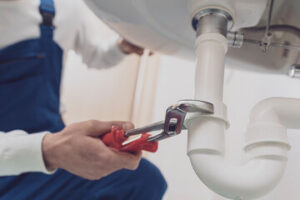Home Plumbing Mishaps You Should Watch Out For
Your home’s plumbing system works seamlessly most of the time, but when something goes wrong, it needs the attention of a licensed plumber. Some problems, like a clogged drain, are minor, while others are more serious, such as water heater leaks or sewer line damage.
Plumber in Akron helps keep your plumbing working well. But these tips will help you find the right home Plumber quickly and easily when an issue arises.

Clogged drains are one of the most common plumbing mishaps homeowners face. Unfortunately, they usually happen at the most inconvenient times and can lead to a lot of problems. While it’s impossible to avoid all clogs, there are things you can do to lower your risk of them happening at home.
When a drain is clogged, water can’t move through it easily, and that means it will build up over time. The result is that your house will start to smell. Moreover, the stagnant water may attract pests like roaches and mosquitoes that carry diseases. If this issue is ignored, it can also pose health risks to your family members.
Most drain clogs are caused by the accumulation of waste. Food particles, hair, soap scum, and other items stick to the walls of pipes and create a blockage. If you notice that a drain is starting to smell bad or that it’s taking longer than usual to empty, it’s a sign of a blockage. Call a plumber right away.
If you don’t act quickly, the clog can cause water or sewage to back up into your house. That means that you’ll have to clean up a mess and will need to replace any damaged items in your home. In addition, the clog can also lead to long-term damage to your pipes.
To prevent clogs, you should only put biodegradable materials down your drains. You should also avoid putting fats, oils, and grease down your drains because they can cause them to clog. It’s also a good idea to use a drain snake at least once a year to remove any debris that has accumulated inside your drains. You should also avoid flushing paper towels and wipes down toilets because they can clog your pipes. Lastly, installing a water softener in your home can help reduce the minerals that cause hard water, which is another common reason for clogged drains.
One of the most common household plumbing problems is a leaky faucet. The constant drip-drip-drip of water can not only be annoying, but it can also lead to high water bills and can cause damage to walls, floors, and cabinetry. A home plumber can repair leaky faucets quickly and efficiently, saving the homeowner time, money, and hassle.
There are a number of reasons that a faucet may be leaking, including worn out or broken washers, mineral deposits on the internal parts, and defective gaskets and o-rings. A professional plumber can inspect the faucet det,ermine which part is causing the problem, and recommend a solution.
Depending on the type of faucet, the first step to take to fix a leaky faucet is turning off the water supply valves under the sink and draining the pipes. Then, remove the handle and decorative cap to expose the screw that holds the faucet together. Once the faucet is apart, the washer and o-ring can be inspected for wear and degradation. If the o-ring is damaged, it will need to be replaced. The washer will usually be housed in the valve seat and can become worn out from friction over time. It can also be the wrong size or installed incorrectly. Water sediments can also corrode inlet and outlet seals.
In some cases, the washer and o-ring can simply be replaced with new ones. If the o-ring is not the culprit, a replacement cartridge can be found by removing the old one and installing a new one in its place. This will usually stop the leaking.
There are some faucet types that require more advanced knowledge and tools to disassemble and repair. These include rotary ball and cartridge faucets, which are characterized by a single handle on a rounded cap that moves up and down to control water flow and left and right to control temperature. These are often found in kitchens and other high-use areas. These faucets can be difficult to diagnose and are best left to a professional plumber. In some instances, the issue could be a problem with the pipes underneath the sink, which would require more serious and expensive repairs or replacements.
If sewage backups happen in your home, you should treat it as an emergency. After all, sewage is a dangerous substance that can cause serious health problems for you and your family. It also poses a major risk for costly damage to your property. In fact, a severe sewer line backup can cost thousands of dollars in repair and cleanup costs. To keep your family and belongings safe, you should watch out for the following signs of a sewage backup:
You’ll know it’s time to call the home plumber if the smell of raw sewage is overwhelming your home. You should also check all the drains and toilets to see if wastewater is backing up in them. If it is, you need to shut off your water and immediately call a plumbing company to come out and fix the problem.
Your Plumber will need to determine the source of the sewage back up and make sure it’s fixed as soon as possible before more damage occurs. You should also contact your insurance company to learn whether or not a sewage backup is covered under your policy.
Sewage backups can be caused by a wide range of things, from tree roots infiltrating your pipes to a blockage in the main sewer line from an overloaded septic tank. You can take steps to prevent sewage backups, such as regularly cleaning your drains and avoiding flushing items down the toilet that shouldn’t be in there.
If you do experience a sewage backup, you should shut off your water and open up windows to ventilate the area. You should also wear personal protective equipment such as an N95 face mask, safety goggles, thick rubber gloves and boots. Avoid coming into contact with the sewage waste as much as you can; it contains harmful bacteria and viruses that can make you sick. Once the sewage is cleaned up, you can have your home restored by a professional restoration company that will disinfect and dry your property with wet/dry vacuums and encapsulation techniques. They’ll also remove and replace any flooring, drywall, and furniture that can’t be saved.
When your hot water heater is not functioning properly, it can make daily tasks such as showering and cleaning hard to do. It is important to have your home plumber take care of any problems that arise with the hot water tank. These problems can include insufficient hot water, noises from the tank and rusty or unpleasant smelling water.
Water leaks are one of the most common issues that can be caused by a water heater, and they should be addressed immediately. If left unchecked, these leaks can lead to significant damage throughout your home and may cause mold or other health issues. If you notice any puddles or dampness around your hot water heater, call a plumber to inspect the issue as soon as possible.
Other issues that can affect your water heater include tripping circuit breakers and high energy bills. These issues are typically the result of sediment buildup within the tank, and a professional can clean the sediment out and drain the water to help resolve the problem. High energy bills may also be the result of a malfunctioning thermocouple or faulty heating elements. In some cases, it may be more cost effective to replace your water heater instead of repairing it.
It is recommended to have a professional flush your water heater every year to help keep it running efficiently. The average fee to have this done is about $200, and it will be well worth the investment.
Some other maintenance that can be performed on a water heater includes testing the temperature pressure relief valve and the dip tube to ensure they are working properly. These are simple tasks that most homeowners can perform themselves, but if you’re not comfortable, a home plumber can do it for you.
Depending on the make and model of your water heater, some repairs may be more expensive than others. The price difference typically reflects the quality of work and the experience of the Plumber. While you can find some plumbers who offer cheap services, it’s often best to go with a reputable professional.
